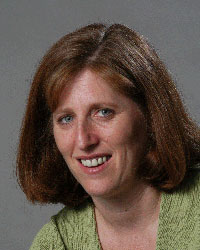Lauded for protein-folding work, 'encouragement of next generation’
The ¬È∂π¥´√Ω…´«È∆¨ and ¬È∂π¥´√Ω…´«È∆¨ Biology has named Susan Marqusee, professor of molecular and cell biology at the University of California, Berkeley, and director of Berkeley’s California Institute for Quantitative Biosciences, the winner of the society’s William C. Rose Award.

“I’m honored to receive an award that recognizes the sum total of what I love about my job — science, mentorship and training,” said Marqusee. “For me, it’s the melding of all three areas that gives me the greatest satisfaction.”
Marqusee received the award in recognition of her extensive thermodynamic and kinetic studies using hydrogen-exchange, nuclear magnetic resonance, and single-molecule methods to study protein structure and behavior at increasingly sharper resolution. According to Walter Englander, professor at the University of Pennsylvania, “this work convincingly revealed that proteins are composed of cooperative nativelike foldon units and demonstrated their key role in protein-folding pathways.”
Professors Carlos Bustamante and Jennifer Doudna of the University of California, Berkeley, nominated Marqusee for the award. “The fundamental nature of Dr. Marqusee’s work has had, and will continue to have, significant impact on many areas of research, ranging from the physical chemistry of macromolecules to the design of therapeutics that prevent the aggregation of proteins which lead to common diseases such as Alzheimer’s,” they wrote in their nominating letter.
Marqusee’s mentorship efforts also are recognized by the Rose Award. Her colleague Jane Clarke from the University of Cambridge hailed Marqusee as “an all-too-rare example of an academic who is not simply a stellar scientist but someone who explicitly factors into her way of doing science dedication to encouragement of the next generation. Her students simply adore her.”
Marqusee will get her award and deliver her lecture at 9:05 a.m. April 24 at the Experimental Biology 2012 meeting in the San Diego Convention Center.
About the award
The William C. Rose Award recognizes outstanding contributions to biochemical and molecular biological research and a demonstrated commitment to the training of younger scientists as epitomized by the late Rose, an authority on protein nutrition and former president of the ASBMB. The award consists of a plaque, $3,000 and transportation to the 2012 ASBMB annual meeting to present a lecture.
Enjoy reading ASBMB Today?
Become a member to receive the print edition four times a year and the digital edition weekly.
Learn moreGet the latest from ASBMB Today
Enter your email address, and we’ll send you a weekly email with recent articles, interviews and more.
Latest in People
People highlights or most popular articles

ASBMB names 2025 fellows
¬È∂π¥´√Ω…´«È∆¨ and ¬È∂π¥´√Ω…´«È∆¨ Biology honors 24 members for their service to the society and accomplishments in research, education, mentorship, diversity and inclusion and advocacy.

When Batman meets Poison Ivy
Jessica Desamero had learned to love science communication by the time she was challenged to explain the role of DNA secondary structure in halting cancer cell growth to an 8th-grade level audience.

The monopoly defined: Who holds the power of science communication?
“At the official competition, out of 12 presenters, only two were from R2 institutions, and the other 10 were from R1 institutions. And just two had distinguishable non-American accents.”

In memoriam: Donald A. Bryant
He was a professor emeritus at Penn State University who discovered how cyanobacteria adapt to far-red light and was a member of the ¬È∂π¥´√Ω…´«È∆¨ and ¬È∂π¥´√Ω…´«È∆¨ Biology for over 35 years.

 Yes, I have an accent — just like you
When the author, a native Polish speaker, presented her science as a grad student, she had to wrap her tongue around the English term “fluorescence cross-correlation microscopy.”

Professorships for Booker; scholarship for Entzminger
Squire Booker has been appointed to two honorary professorships at Penn State University. Inayah Entzminger received a a BestColleges scholarship to support their sixth year in the biochemistry Ph.D. program at CUNY.

